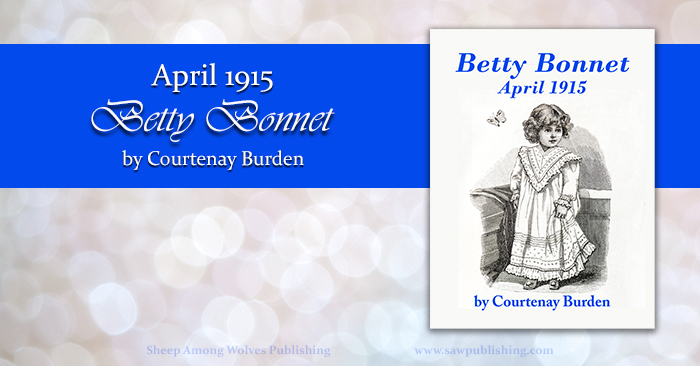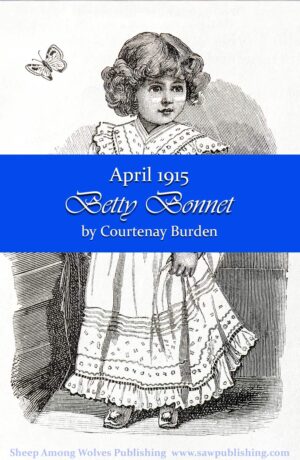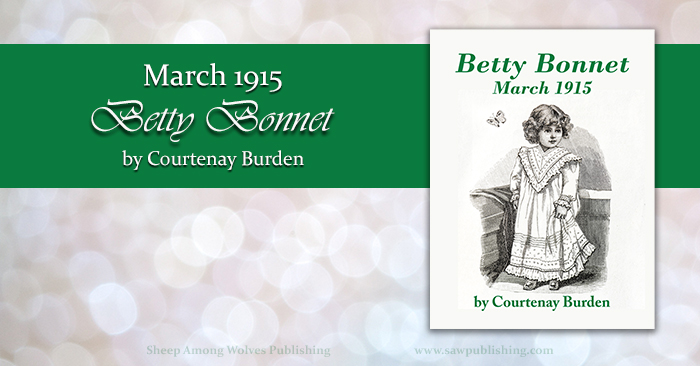Betty Bonnet: April 1915
 Betty Bonnet is an ongoing serial story, released on the Sheep Among Wolves blog once a month. It follows the adventures of the Bonnet family, first created by Sheila Young as a paper doll series released in the Ladies’ Home Journal beginning 1915. To go to the first episode, click here.
Betty Bonnet is an ongoing serial story, released on the Sheep Among Wolves blog once a month. It follows the adventures of the Bonnet family, first created by Sheila Young as a paper doll series released in the Ladies’ Home Journal beginning 1915. To go to the first episode, click here.
I.
It was not until Mr. Anderson spoke, that Billy and I realized what an atrocious thing we had been ignorantly countenancing.
It was not until Mr. Anderson spoke that we really realized just how—unconventional—Mr. Anderson’s shop window had become.
We still thought of Betty’s doll as reclining inconspicuously in a back corner, as she had done when we first made her deplorable acquaintance so many weeks before. One does this, sometimes, with other things besides dolls. Now the weeks had passed, and the situation of the Pitied One had altered as gradually and as irrevocably as the winter snows under the genial April sun—with this exception, that while the action of the sun worked, by invisible processes, to shrink the dimensions of the slushy banks, the work of Time upon Betty’s doll had produced an exactly opposite effect. The snow had shrunk. Doll and Co. had swelled. But Billy and I had fancied, somehow, that she still occupied that inconspicuous corner on the far flank.
 II.
II.
“I’ve only been giving her things to wear,” explained Betty, too much in earnest even to be shy.
“Giving her things to wear!!!” spluttered Mr. Anderson, with the indignation of a man who has just discovered that the window he thought belonged to his toy shop has apparently metamorphosed into an advertisement for an inferior grade of worsted yarn.
“We are very sorry, sir,” I interposed as hastily as I could. The pronoun was not an equivocation. Both Billy and myself were indisputable very, very sorry. “It was—it was—rather—under the circumstances, we can even say entirely—entirely—”
“I’m not talking to you,” said Mr. Anderson dismissively. “I do not imagine those atrocious—things—are your handiwork, ma’am?”
If I had wanted to say they were, the shopkeeper’s tone of withering scorn would have blighted the admission halfway.
“They—they aren’t mine,” I murmured faintly, wondering somewhere in the back of my brain why they chose adults to escort children home from school. Was there some mistaken impression that they did anything? Or was it only that if anyone had sent a minor to such agony, the Society for Prevention of Cruelty would have interfered?
III.
“Do you mean the knitted things?” said Betty, with wide-open eyes. “I made them, myself. She looked so cold, the poor darling. And I don’t believe she thought anybody loved her at all, the poor dear.”
Of course, respectable owners of well-stocked toy shops, with windows on two streets, do not gnash their teeth. They have too much personal self-respect. This is probably the reason—and the sole reason—why Mr. Anderson did not gnash his.
“Madam,” he said, with an icy compound of civility and sarcasm, “I can only ask what I could possibly be expected to do now?”
Betty had held up gallantly to this point, but as it gradually sank into her consciousness that Mr. Anderson was not only very angry, but also expected some sort of undefined reparation, her courage gave way. Her little round lips began to tremble. Her plaintive brown eyes filled with tears. She looked at me, beseechingly. Billy looked at me, reproachfully. Mr. Anderson looked at all of us with undisguised disgust.
There was no hole in the ground through which we could affect a tactful retreat. I know, for I had already looked. There was a manhole, it is true, about six feet off, but the cover was bolted down securely, putting it out of the question. When one attempts to sink into the floor for very shame, it is always awkward and anticlimactic to have to stop and shoot a couple of bolts before one pulls off the escape.
IV.
“I ask you, what am I to do?” repeated Mr. Anderson, if possible more fiercely than before.
It was Billy who came to our rescue and answered the question.
“I know,” he said.
“You know?” repeated Mr. Anderson, suspiciously.
“Yes, I know,” asseverated Billy with confidence. “But I can’t do it today.”
Mr. Anderson gave a disbelieving grunt.
“I really can’t,” insisted Billy. (Billy has a very persuasive way of saying really. Even Mr. Anderson seemed to feel its force.) “It’s not the sort of thing you can do without—”
Billy stopped abruptly.
“Well?” said the unsympathetic shopkeeper.
Billy stood up on his tiptoes, and blared into Mr. Anderson’s ear in a confidential whisper. “You can’t do it without a cart!!!”
That was all the insight Billy would give. But as he—apparently—had some sort of plan, and as no one else (Mr. Anderson included) had anything more helpful to offer, we were allowed to go on our way.
“I’ll come on Saturday!” Billy called back encouragingly over his shoulder.
V.
All this happened upon a Wednesday—the last day of March, as I have already observed. From Wednesday to Saturday Betty and I lived in a state of ill-supressed curiosity. On Friday night, Billy was seen to have a long and secret confabulation with Bob, behind the dining room curtains. And on Saturday afternoon, they both disappeared, accompanied—as both Betty and myself discovered by shamelessly peeping through the upstairs windows—by a Bob’s hand-wagon.
Had we known exactly the right moment for spying on the return trip, we would no doubt had peeped just as gracelessly when they came back. Unfortunately, we were both back in the kitchen, making ourselves useful rolling crust for the Easter pies.
And the boys, with exasperating secrecy, would say nothing about where they had been.
Only when little Bonnie and I were playing in the square of back yard that we make believe is a garden, just before bedtime, we discovered that the garden shed was most unaccountably fastened with the patent pad lock usually reserved for Bob’s bicycle.
VI.
The mystery was very great. Betty—who sometimes has a little trouble separating the temporal and the spiritual—was very unhappy at going to bed without knowing whether her beloved protégée was languishing in Mr. Anderson’s shuttered shop window bereft of every touch of gladness for the coming Easter morning.
“Everyone ought to be glad, on Easter,” she murmured mournfully. It was no good to tell her that the lamented doll could not feel. Betty could. And she felt enough for two.
We, in our human wisdom, fancy the tender Shepherd does not stoop to comfort so childish a woe. Perhaps it is only because we have not truly grasped the depths of His pity. Certainly it was the thought of His loving care that comforted Betty when she at last fell asleep.
And shall we say it was not His joy, that lit Betty’s heart when she was wakened—very early on that Easter morning—by a most peculiar symphony echoing up to the nursery windows?
VII.
The nursery windows, you understand, are at the top of the house. The symphony had to pass everybody else’s windows to get up to them. One by one, with varying expressions of sleepiness, indignation, or wonder, those of use who occupied the lower bedrooms (as well as a few who occupied bedrooms in neighbouring houses) put our heads out our own particular windows.
Then we rubbed our eyes, and looked again.
For there, on the stubbly garden grass, flanked by Billy and Bob, keeping up a reckless orchestral accompaniment consisting of two penny whistles, a toy drum, and a pair of pot lids, was—
Yes, it really was! Beneath a mound of assorted worsted masterpieces, her battered arms and legs sticking out triumphantly, and her faded face smiling jubilantly up at the sun, was Betty’s Doll!!!
VIII.
“He said he wouldn’t sell her, you know!” Billy shouted up triumphantly to Betty. “He said he wouldn’t sell her, but he never said anything about giving her away! He’s gived her. All to you, Betty! And he says you may keep her forever, if only you won’t be kind to anymore of his toys!”
“Oh!” cried Betty, with a gurgling, gasping voice.
Then we could hear her feet, flying down successive flights of stairs, and in another moment Betty had rushed into the arms of her tattered and beloved doll.
And that is really the whole story of how Betty’s doll came to belong to Betty—and how Mr. Anderson was transformed from a foe to a friend.
(It is not, however, the whole story of Betty Bonnet herself. Come back for more of Betty’s adventures next month!)
If you missed the last episode of Betty Bonnet, you can find it right here:
You might also enjoy:

Are you weary? Exhausted? Maybe even “sore distressed?” Old Ruddy’s Questions will challenge you to take a closer look at the foundational truths of your faith—and the way those truths intersect with everyday life.

Whether self-denial means carrying out our highest aspirations, or setting them willingly aside to serve others, Tabby’s White Hyacinth brings a valuable reminder that when we give up our own will, we present the most precious Easter tribute in our power.

Sap is beginning to flow in the trees and Grandpa needs help in his sugar bush! One of the cleanest, most family-friendly books I’ve ever reviewed, At Grandpa’s Sugar Bush is an informative and enjoyable read-aloud.


Ahhhh, I love this so much!!! ❤️❤️❤️
Also, your style is so perfect for it! 😄
Thanks, Angie! I have to admit, it’s very much a copied turn-of-the-century style. But I’m loving writing it!